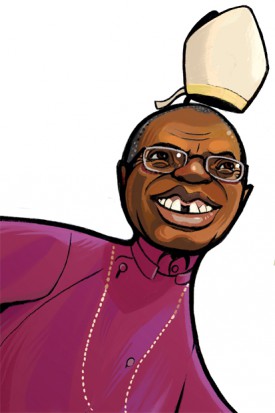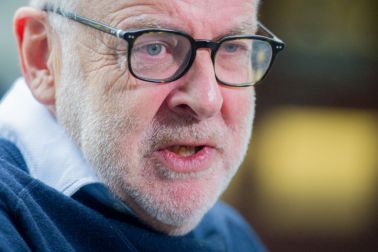Given the political parties are already well underway with their General Election campaigns, the Church of England couldn’t have waited much later to dispense its advice on how to campaign and what to campaign about. In this week’s Spectator, the Archbishop of York gets on with handing out some of that advice, telling me that politicians are behaving like men arguing at a urinal over who is ‘the biggest of the men’ and explaining why he’s edited what appears to be a pretty lefty collection of essays called On Rock or Sand? Firm Foundations for Britain’s Future. You can read the full interview here.
That book includes a chapter from John Sentamu and one from Justin Welby, and both contributions will unsettle members of the current government as much as the ‘Marxist’ Faith in the City did in 1985. Here’s just a highlight from the Welby chapter:
‘But, in another sense, the economic realities of today are even more complex than in the biblical parable. There are entire towns and regions of our country that are being left ‘outside the vineyard’, as it were, trapped in an apparently inescapable economic downward spiral. Reasons for this are complex (under-productivity, globalising markets, outsourcing of labour, etc.), but the reality remains the same: we are a people in crisis.’
The bishops’ apparent distaste for consumerism has garnered a great deal of attention this morning, with the Telegraph arguing that this ignores the fact that people buying things is good for other people too. But Sentamu seemed less concerned with the fact that people were buying things than with why they were doing it. I asked him whether he thought Britain was a spiritually healthy society:
‘I don’t actually think in terms of a spiritual, moral, philosophical, cultural, we are at ease with ourselves, I don’t think we are, I mean… John Major… in 1992 said he wanted a nation that is at ease with itself. I don’t think we are at ease with ourselves! If we are at ease with ourselves, why did Black Friday look so ugly? I mean why did it look so ugly?’
He is very concerned about household debt, and before Christmas had used sermons and TV interviews ‘I hoped people if they are buying presents they should not pay buy presents beyond their means. Because it’s going to be tomorrow when you need food on their table and that sounds like, and people say you’re a killjoy but it was the point.’
But Sentamu knows that his intervention this time round will be greeted by some as it always is: why is the Church poking its nose into politics and what right does it have to do so anyway? He writes in the book of the need for the church to earn its right to participate in the public debate, and in our interview I asked him whether this could continue to happen when congregations were declining. Here’s the full transcript of those exchanges:
IH: ‘But congregations are dwindling, aren’t they?’
JS: ‘Well, you say so! But if only you’d been here at Christmas and I tell you the figures. In the York Minster, the first carol service was 2,500.’
IH: ‘But that’s carol services. I worked at a church where our size doubled for carols.’
JS: ‘But the following day the children’s crib service 2,500. Second carol service 3,700, 300 couldn’t get in. Midnight 2,500.’
IH: ‘But what about February?’
JS: ‘Christmas morning 2,000 people coming in. Churches will tell you that actually we are beginning to see signs of new life emerging. And the other thing which would make me say this if you said in York Minster, years ago that they were concerned about the poverty in Middlesbrough, I think they prayed. I think they would be praying for that. They presented I think about two tonnes of food to be distributed in Middlesbrough.’
IH: ‘So it’s about church being involved in the community.’
JS: ‘The Church has realised that worship and listening to Jesus sometimes has got to come first of all a caring of the needs of the people. When a church considers itself to be truly worshipping God, truly caring, truly concerned, you attract.
‘I have been doing evangelistic missions at different places in this part and I am seeing, well, either I am being invited by the Bishop of Blackpool to speak at a big evangelistic event and we fill the ballroom in Blackpool with 350 people want to come and find faith in Christ.
‘So what is going to happen… William Temple was right you will not retain the Christian social order until you get enough sufficient Christians committed to living and serving Jesus, so the challenge of dwindling congregations is a real challenge, but all I would say how did Jesus turn this around? Well, the death, resurrection, pouring of the Holy Spirit on the day of Pentecost, the Church which probably was only about 500 to start with, that very day 3,000 came to living faith and they started caring for the poor, the lonely and in the acts of the apostles they actually get a church which is both growing in numbers but also growing in service.’
But I never really got a good answer on whether the church is visibly growing beyond those anecdotal signs of life. Sentamu’s colleagues offered me statistics on the number of weddings and funerals that the CofE holds every week, but that is still different to the number of people who pitch up on Sundays for a full service, or even the number of people who consider themselves members of their local church.
It is right that the Church is immersing itself in the community more, but it does also need to be growing as a Church. It may run food banks, homeless shelters and debt advice services, but it is above all a Church – and all those things can exist in an entirely secular context too. If the Church is to earn its voice in public debate then it needs to be able to show evidence that it really is growing, rather than occasionally swelling for carol services and weddings.







Comments